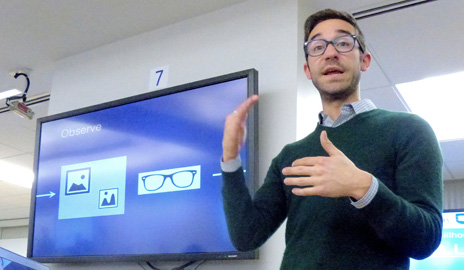
A project to create a virtual roundtable for students studying Spanish took the Grand Prize in the first Online Education Innovation Grant Competition for graduate students.
The contest was conceived by Risa Sodi, associate director of the Yale Center for Teaching and Learning and director of academic advising for Yale College, with the goal of acquainting graduate students with the online teaching environment. Sodi obtained funding for the competition from the Rosenkranz Fund, via the Online Education Committee.
Ten graduate students or teams of graduate students were selected from 19 applicants in November and awarded $500 each “to develop innovative teaching projects that are enhanced by the use of technology.” They presented their projects to the Yale community during the inaugural Online Education Innovation Showcase, held March 26 in the TEAL (technology-enhanced active learning) 2 classroom at 17 Hillhouse Ave. A group of faculty, students, and professional staff chose the winners, who were announced on April 6.
Winning projects
Ian Althouse, a Ph.D. student in Spanish and Portuguese, won the Grand Prize of $1000 to further develop his project, “Creating an Interactive and Multimodal Reading Module for Second-Language Learners Using Web-Based Collaboration Software.”
He describes his project as “an online round-table discussion in which Spanish language students collaborate virtually and on their own time by recording video comments on the VoiceThread media platform. Their reading assignments thus become collaborative projects, not solitary activities, as they read, listen, and speak in Spanish together outside of class.”
Two Distinguished Achievement prizes of $500 each were awarded to Jon Powell, a Ph.D. student in engineering and applied science, for “Transforming Laboratory Learning at Yale through the Electronic Laboratory Procedure Assimilation Portal (eLPAP)” and to the Yale Science Diplomats, a science education outreach group composed of Yale graduate students, for “Science on Demand: Connecting Students and Yale Researchers through Online Videos and Activities.”
Powell’s eLPAP builds on experientially and visually based learning concepts to fundamentally alter the way laboratory techniques are taught. It bundles all the elements needed for successful laboratory procedures into one package, including visuals of every step, and allows access to key lab techniques permanently stored in the Cloud from the classroom, office, or lab. The eLPAP, explains Powell, allows students to learn lab procedures quickly and independently, and instructors to achieve procedural continuity while enhancing knowledge retention of the methods that are most important to their research.
“Science Shorts” is a series of science videos produced by the Yale Science Diplomats as supplemental teaching material for use in high school classrooms. These videos feature graduate student scientists presenting their research, and are freely accessible online along with ready-to-use, standards-based educational material developed specifically for each video.
Adapted from Yale News